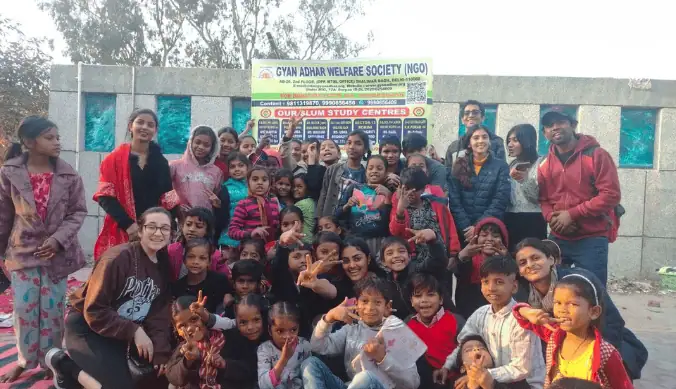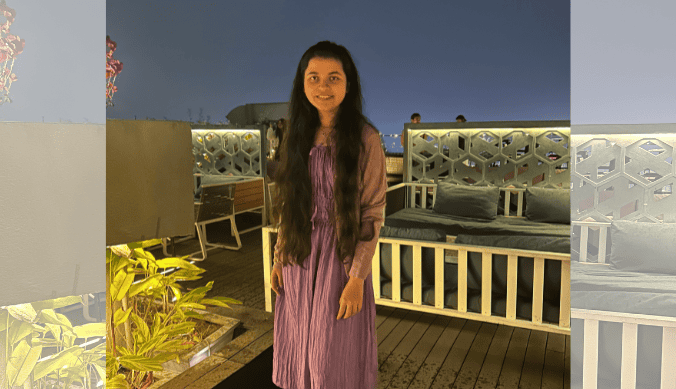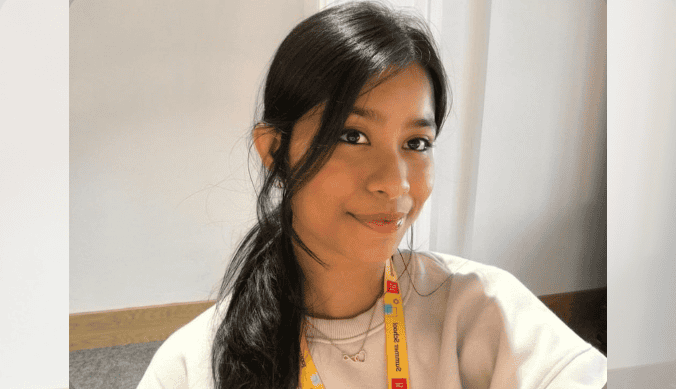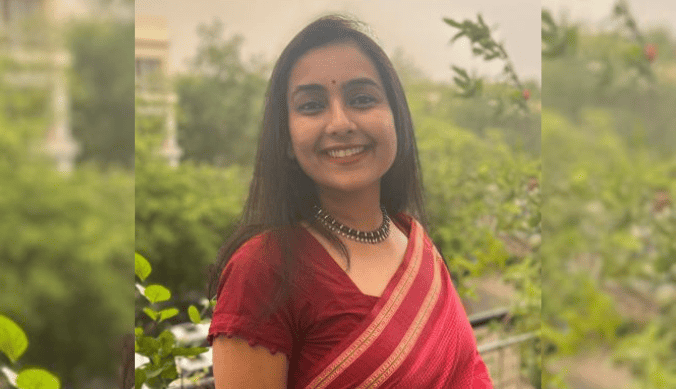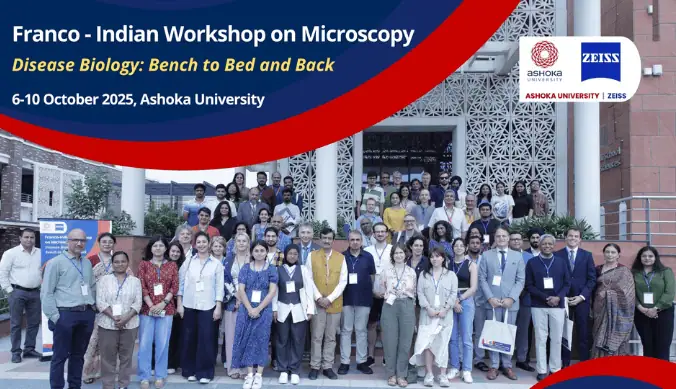“Higher Education Must Give Students Both Skills and Values”: Fashion Designer Mossi Traoré
Fashion meets responsibility in this compelling discussion with Mossi Traoré at Ashoka University, where he speaks about ethical design, innovation with impact, and his vision for nurturing the next generation of changemakers.
During his visit to Ashoka University as part of the Lodha Genius Programme, acclaimed French designer Mossi Traoré engaged in an intriguing conversation on fashion, innovation, and social responsibility. With roots in the suburbs of Paris and a deep connection to both Africa and India, Mossi’s journey is a powerful story of resilience and reinvention. From working with global names like Chanel and L’Oréal to dressing Bollywood stars and developing sustainable fabrics from milk and soil, his work pushes boundaries while staying grounded in purpose. At Ashoka, he shared the values that drive him, the importance of mentorship, and how educational institutions can play a transformative role in creating socially conscious leaders.
You wear many hats – designer, mentor, innovator, and changemaker. But if you had to describe yourself in your own words, how would you define who you are?
Mossi: Who am I? Sometimes I’m a fashion designer. I’m someone who just wants every day to be free, to do what I like, what I love, and what I believe in. That’s my side as a designer. And then also, working in education, I found a fashion school in Paris, a very inclusive school. So sometimes, as you say, I’m a mentor. I help the younger generation get introduced to the fashion industry.
I’m also a social worker. I work to create a social impact in the fashion industry. Innovation takes time, so I’m also involved in some projects as a businessman. And sometimes I work to bring culture to my city because I want to promote fashion in the suburbs of Paris. All of these different elements make up the world of Mossi.
That’s a lot. It’s still so many things that you do. But then, you know, when people look at a magazine or read an article about you, they see only the tip of the iceberg, right? There’s a lot of effort that goes on behind the scenes. So you are doing all these multiple things, juggling between your mentorship and your fashion label, which is Mossi.
You’re building a brand and running a school at the same time. How do you manage this balance?
Mossi: I think one person alone can’t manage all of that. You need to have a good team. You need to have an interest. I have some good people with me. But in the end, everything is your responsibility. If something goes wrong, you are the one.
You have to manage everything. That’s a big responsibility. It takes a lot of energy and pressure. But it’s okay, I’ve had this experience for many years. I don’t question it. I try my best. I try to make things good. And I believe in myself and my team. So it’s about the mindset.
You grew up in the suburbs of Paris, with roots in Africa through your parents. Fashion isn’t always the most expected path in that context, so what first drew you to it? What sparked your interest in entering the fashion world?
Mossi: I’m someone who loves to be where people don’t expect me to be. So I was very happy to go into fashion. I found my place in this world and in this industry. I will do my best to exist between them. But we got some distinction in fashion, and I was surprised by how big it became for me.
It’s not typical to be someone from the suburbs and have this kind of opportunity to work in the fashion industry. Maybe I’m a dreamer. Maybe I have a lot of ambition. I think I was not scared to go into this world. And if the door is closed, okay, I will go by the window or by the roof. I think it’s about your personality, your capacity to challenge yourself and to challenge people. Fashion designers and business managers are people who have to manage all the things around them. They are the ones who also carry the pressure and the obligation to stand up and move a project forward.
Why fashion? Did you have any other interests, or was it always fashion for you?
Mossi: When I was a kid, it was soccer. But soccer at that time wasn’t just about money; it was about being famous, being a celebrity. Just being a champion. I was into it. Sports were so cute to me. But when I became a teenager, I forgot about that dream. When I was in France at that time, I just wanted to have a good time and be a gentleman in school. And because of this feeling for style, I discovered the fashion industry. I think I was maybe 17. That’s when I said, okay, I know what I want to do. I want to work in the fashion industry. And then I was happy. It was good for me because once I decided to work in fashion, I was focused on it.
Seeing models strengthened my conviction. And I said to myself: fashion design is the only door I want to open, and close behind me. That was how I was connected to fashion. After that, I studied at a fashion school, and I was very happy. I had some teachers who gave me the path into fashion. I met wonderful people. I think maybe my destiny was to work in fashion. Okay, so it’s nothing else but fashion. One thing that’s quite surprising is that you’ve worked with very big brands like Chanel and L’Oréal. These are brands that most fashion designers only access after many years in the industry. But you partnered with them quite early in your career.
Beyond your life philosophy and the social impact, you’re driving, your work with science is nothing short of magical. One fascinating example – your clothing made from milk! Could you tell us how you discovered this idea and how the process actually works?
Mossi: It’s because I met some people from the milk industry in France. I asked them about a past project that involved milk fibre. They gave me a mission to work on a new project. I found some partners in Italy, and together we developed the project.
Afterwards, I used that fabric to make a collection for Paris Fashion Week. I wanted to introduce this new innovation during one season. It was very exciting. Now I’m working to create an ecosystem, maybe joining manufacturers and milk companies to create new textiles together. That’s my challenge now.
You’ve also developed another remarkable product from soil. It looks and feels just like any other piece of clothing, yet it’s the result of intensive research and collaboration with chemists and science-led companies. Given that you don’t come from a scientific background, how did these partnerships come about?
Mossi: I met a company that was working on how to clean soil. After I met them, I became motivated to work together. I saw their industry and what they were doing, and I thought maybe we could do something similar to the milk fibre project. So we took time to understand and explore what we could create together. The fashion industry is under scrutiny because of its negative environmental impact. These companies also face waste issues. So I thought maybe we could find a solution together. That was our goal.
Then we went to talk to a bigger textile innovation research centre. It was the combination of all these skills and expertise that made the Earth fabric project possible, after one year of work.
You’ve been to India more than 20 times. What attracted you to the country?
Mossi: I love Indian culture. It’s a strong country with a rich future, so I love that. I love Indian people. Every time my friends ask me why I keep going to India, I tell them that Indian people teach you how to smile at life, and how to share your brain with your hand, to another hand.
It makes me feel very comfortable. When I’m in India, it feels like I’m in Africa. It reminds me of African traditions, the respect for family and parents. India is a very dynamic country. Sometimes, I just need to leave Paris and come to India to feel grounded.
You’ve spoken about your admiration for Bollywood, even before your rise in the fashion world. What is it about Bollywood that has resonated with you so deeply over the years?
Mossi: When I was a kid, people used to watch Bollywood movies at home in Africa and in Paris. You know, people in France whose parents are from Africa, we all watched Bollywood. People from many different communities, Arabic people, Black people, West Africans, Mauritians, so many were watching Bollywood movies. For three hours, it was like a dream. A dreamland. It made everything seem possible.
That was good for my mindset, to believe in something and to make things happen. And Bollywood actors are really good. When we were kids, we watched with subtitles. So you just watched with your heart, and it really connected with you. And when I started to study fashion, everyone in school wanted to dress like big American celebrities. But I was the only one who wanted to dress like Bollywood stars.
You had the chance to work with Bollywood Actress Aishwarya Rai Bachchan, not just once, but twice. That clearly reflects a strong dynamic with her and her team. What was the experience like working with her?
Mossi: Yes, we did two dresses for the L’Oréal fashion show. But my first dream came true with Kalki when I did the Lakmé Fashion Week in 2014. She wore one of my dresses. Then, with L’Oréal, when they came to me for a fashion show, I had an exhibition with a big mission in Paris. I wanted to introduce someone from Bollywood to what we did; it was the realisation of a dream. Dressing Bollywood stars was something I had always wanted to do.
It was a big challenge because she had a very good taste and a strong vision of fashion and how to wear a dress. So you have to be ready. There was always some distance because I was in Paris, and she was in India, so planning wasn’t always easy. But it was a very good experience. If I work with more Bollywood actors in the future, it will be the same pleasure.
Who would you like to work with in Bollywood next?
Mossi: Kajol and Alia Bhatt. I’d love to dress all of them – Deepika, Rani Mukherji, Madhuri Dixit… It’s an exhausting list across all generations!
You spoke at the Great Ideas Seminar, part of the Lodha Genius Programme at Ashoka. How do you think initiatives like this, and a university like Ashoka, align with your philosophy and contribute to creating a positive impact on society?
Mossi: I think in a project like Ashoka Care or similar initiatives, when you give good values to your students, that becomes very good for the school. When those students go on to work in companies, they carry those values. That’s very important. If one student opens a door, then ten others can follow and work in that company too.
For me, higher education has two missions: to provide good academic skills and to instil strong values. Because when students go to work, they are like ambassadors of their college.
Study at Ashoka








